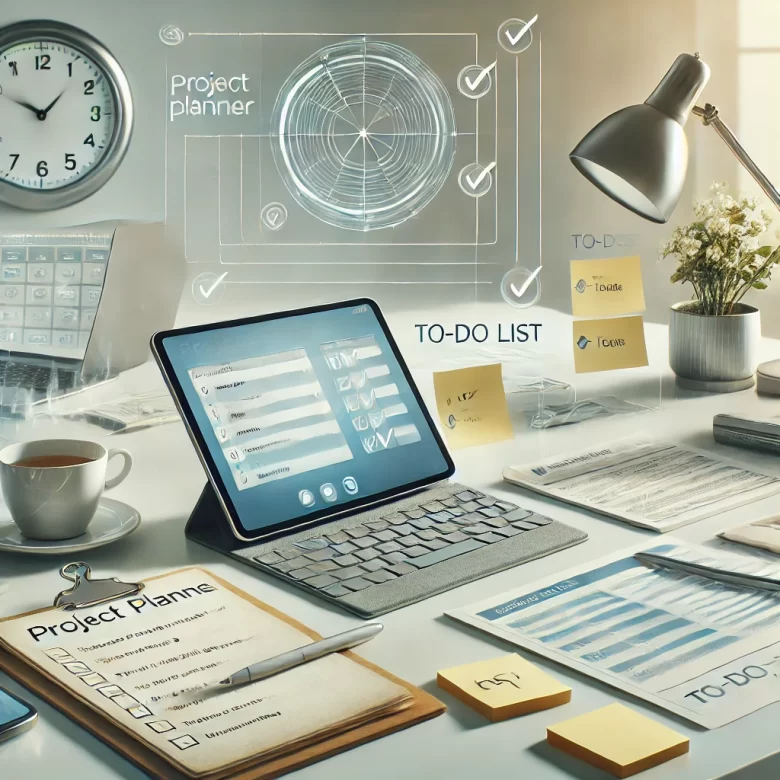When managing projects, whether in your personal life or at work, the ability to plan tasks efficiently is key to achieving success. Planning ahead ensures that you stay on track, avoid unnecessary stress, and make the most of your time. However, many people struggle with task management because they either overcomplicate the process or fail to break down tasks effectively.
In this article, we will explore simple yet powerful strategies to plan your tasks efficiently and keep your projects organized, helping you stay productive and meet deadlines with ease.
The Importance of Planning
Without a solid plan, projects can quickly spiral out of control. Tasks can become overwhelming, deadlines can be missed, and progress can feel slow. Whether you are managing a work project, planning a personal event, or tackling a long-term goal, the key to success is always effective planning. The sooner you start organizing your tasks, the easier it will be to stay focused and productive.
Planning your tasks efficiently doesn’t mean you need a complex system—it simply requires a structured approach that works for you. By breaking down large projects into manageable steps and organizing them in a logical order, you can significantly increase your chances of success.
Break Down the Project into Smaller Tasks
A common mistake when starting a project is to dive in without clearly defining all the tasks involved. Projects can be overwhelming if viewed as one large chunk. The first step to organizing any project is to break it down into smaller, actionable tasks.
How to Break Down a Project:
- Start with the big picture: Write down the overall goal of your project. What is the desired outcome?
- List the major milestones: Identify the key stages or milestones that must be achieved to complete the project.
- Break each milestone into smaller tasks: For each major milestone, create a list of smaller tasks required to achieve that step.
By breaking the project down into bite-sized tasks, you’ll find it easier to focus on what needs to be done and prevent procrastination.
Prioritize Your Tasks
Once you’ve broken down your project into smaller tasks, it’s time to prioritize. Not all tasks are created equal, and some will be more time-sensitive or critical than others. Prioritizing ensures that you focus on the most important tasks first, making sure you’re making progress on the right things.
How to Prioritize Tasks:
- Use the Eisenhower Matrix: The Eisenhower Matrix divides tasks into four categories:
- Urgent and Important: Do these tasks first.
- Important but Not Urgent: Schedule these tasks for later.
- Urgent but Not Important: Delegate these tasks if possible.
- Neither Urgent Nor Important: These tasks can be eliminated or postponed.
- Consider deadlines: Some tasks may have specific deadlines or depend on other tasks being completed first, so be sure to consider timing when prioritizing.
- Evaluate task impact: Focus on tasks that have the most significant impact on the outcome of your project.
By prioritizing effectively, you’ll ensure that your time and energy are directed toward the tasks that matter most.
Set Clear Deadlines
Deadlines are crucial to staying organized and on track. Without a clear timeline, it’s easy to lose focus and let tasks drag on. Setting deadlines helps to create a sense of urgency and accountability, ensuring that you don’t procrastinate.
How to Set Realistic Deadlines:
- Assess task complexity: Some tasks will take longer than others, so be realistic about how much time each task will require.
- Give yourself buffer time: Life happens, and things don’t always go as planned. Build in some buffer time to account for unforeseen delays or interruptions.
- Break large deadlines into smaller ones: If your project has one big deadline, break it into smaller deadlines for each milestone or task. This makes the project feel more manageable.
By setting deadlines for individual tasks and milestones, you’ll keep the momentum going and ensure that the project is progressing steadily.
Use a Task Management System
To keep track of all your tasks and deadlines, it’s important to have a task management system in place. Whether you prefer digital tools or a paper planner, having a system that allows you to organize and track your tasks will help you stay on top of your project.
Popular Task Management Tools:
- Trello: A visual tool that uses boards, lists, and cards to organize tasks. Great for project management and collaboration.
- Asana: A robust task management software that allows you to create projects, set deadlines, and track progress.
- Todoist: A simple yet powerful to-do list tool that helps you organize tasks and set reminders.
- Google Calendar: Use it to set deadlines and reminders for tasks. You can color-code events and block out time for specific tasks.
No matter which tool you choose, having one in place will make it easier to keep everything organized and ensure you stay on top of your tasks.
Delegate Tasks When Possible
Effective project management isn’t just about doing everything yourself—it’s also about knowing when to delegate tasks to others. Delegating allows you to focus on the most important tasks while ensuring that other aspects of the project are still progressing.
How to Delegate Tasks:
- Identify tasks that can be outsourced: If a task is time-consuming but doesn’t require your specific expertise, consider delegating it to someone else.
- Clearly communicate expectations: When delegating, make sure to communicate exactly what needs to be done, the deadline, and any other important details.
- Trust others: Once you’ve delegated a task, trust that the person responsible will complete it. Avoid micromanaging.
Delegating tasks frees up your time to focus on higher-priority items and ensures that the project progresses smoothly.
Monitor Progress and Adjust Plans
Even the best-laid plans can encounter roadblocks. It’s important to regularly monitor the progress of your project and be ready to adjust your plan as needed. Flexibility is key to staying on track and achieving success.
How to Monitor and Adjust:
- Review your progress regularly: Set aside time to review your tasks and check if you’re meeting your deadlines.
- Identify roadblocks early: If you encounter a delay or obstacle, address it early before it becomes a larger issue.
- Adjust timelines or priorities: If necessary, adjust your deadlines or priorities to accommodate changes in the project.
By staying proactive and flexible, you’ll be better equipped to handle challenges and keep your project on course.
Celebrate Small Wins
As you move through your project, it’s important to celebrate your achievements along the way. Completing smaller tasks and hitting milestones is a sign of progress, and taking the time to acknowledge these wins can help keep you motivated.
How to Celebrate:
- Reward yourself: After completing a major task or milestone, reward yourself with a small treat, a break, or an activity you enjoy.
- Reflect on progress: Take a moment to appreciate how far you’ve come and the work you’ve put in.
Celebrating small wins keeps your motivation high and reminds you that progress is being made.
Stay Motivated Throughout the Project
Planning and organizing tasks is only part of the process. The true challenge comes in staying motivated throughout the entire duration of a project. It’s common to lose steam, especially when the task feels long or overwhelming. Here are some strategies to maintain motivation and keep you moving forward.
How to Stay Motivated:
- Set Mini Goals: Instead of focusing solely on the end result, break your project down into smaller mini-goals. Each time you reach one of these smaller goals, take a moment to celebrate and feel accomplished. This will give you a sense of progress and motivate you to tackle the next task.
- Visualize Success: Take a few minutes each day to visualize the outcome of your project. Imagine how great it will feel when you finish. Visualizing success can inspire you to push through tough moments and remind you of why you started in the first place.
- Use Positive Affirmations: Motivation often fades when self-doubt creeps in. Remind yourself that you are capable of completing the project. Use positive affirmations like, “I can handle this,” “I’m making progress,” or “Every step counts.” These little boosts of encouragement can help to reset your mindset and keep you on track.
- Change Your Environment: Sometimes, a change of scenery can make a world of difference. If you find yourself getting distracted or tired of your workspace, try moving to a new environment, whether it’s a different room, a café, or even outdoors. A fresh environment can help to refresh your focus and energy.
- Find a Support System: Surround yourself with supportive people who encourage you to keep going. Whether it’s a colleague, friend, or family member, having someone to check in with can help keep you accountable and motivated. You can share your progress with them, ask for advice, or simply use them as a sounding board when you hit roadblocks.
- Take Care of Your Well-Being: Staying motivated isn’t just about mental fortitude; physical well-being plays a huge role as well. Ensure you’re getting adequate sleep, exercising regularly, and eating healthy. When your body feels good, your mind follows suit, and it becomes much easier to stay motivated and productive.
- Be Kind to Yourself: Finally, remember that motivation fluctuates, and it’s okay to have off days. Be kind to yourself when things don’t go as planned. Instead of focusing on what you haven’t accomplished, celebrate what you have done and adjust your plan accordingly. Perfection is not the goal—progress is.
By applying these strategies, you’ll find it easier to stay motivated throughout your project. Remember that maintaining motivation is about consistency, not intensity. Small, sustained actions will get you further than sporadic bursts of effort.
Review and Reflect Upon Completion
Once you’ve completed your project or reached your main goal, it’s important to take a step back and reflect. Reviewing what went well, what challenges you faced, and how you can improve next time will help you continuously refine your project management and task planning skills.
Tips for Reflecting:
- Evaluate the process: Were your timelines realistic? Did your priorities align with the goals you set?
- Celebrate your success: Acknowledge the effort you put in and take time to reward yourself for achieving your goal.
- Identify lessons learned: Every project is an opportunity for growth. What would you do differently next time? What methods or tools worked best?
Reflecting on your project not only helps with personal growth, but it also prepares you for even more organized and efficient projects in the future.
Organizing your projects and planning your tasks efficiently doesn’t have to be complicated. By breaking down large projects into smaller tasks, prioritizing effectively, setting clear deadlines, using a task management system, and delegating when needed, you can keep your projects organized and on track. Regularly monitoring progress and adjusting plans as necessary ensures that you stay flexible and proactive in achieving your goals. And remember, celebrating small wins along the way will keep you motivated and moving forward. With these strategies in place, you’ll find that task planning becomes less stressful and more rewarding, allowing you to complete projects efficiently and effectively.




